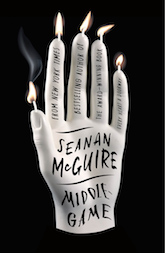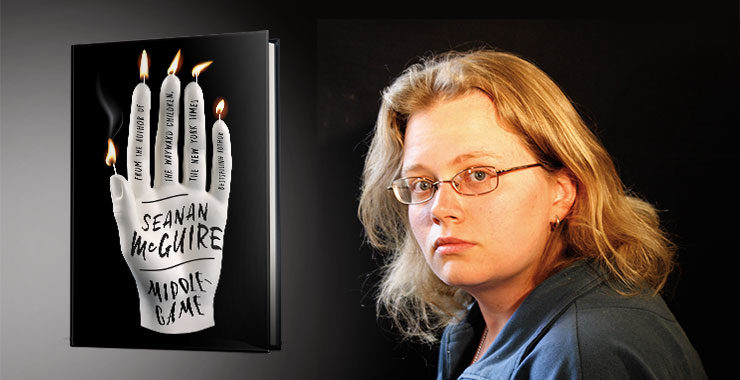Meet Roger. Skilled with words, languages come easily to him. He instinctively understands how the world works through the power of story. Meet Dodger, his twin. Numbers are her world, her obsession, her everything. All she understands, she does so through the power of math. Roger and Dodger aren’t exactly human, though they don’t realise it. They aren’t exactly gods, either. Not entirely. Not yet.
Meet Reed, skilled in the alchemical arts like his progenitor before him. Reed created Dodger and her brother. He’s not their father. Not quite. But he has a plan: to raise the twins to the highest power, to ascend with them and claim their authority as his own.
Godhood is attainable. Pray it isn’t attained.
Author Seanan McGuire introduces readers to a world of amoral alchemy, shadowy organizations, and impossible cities in the standalone fantasy, Middlegame, out from Tor.com Publishing on May 7th. Read Part Two below, or head back to the beginning with Part One!
BOOK 0
The Beginning
Medicine rests upon four pillars—philosophy, astronomy, alchemy, and ethics.
—Paracelsus
Time is the substance from which I am made.
—Jorge Luis Borges
Genesis
TIMELINE: 11:14 CST, OCTOBER 31, 1886.
The air is heavy with the crackle of electricity, with the taste of ozone and mercury and the burning tang of alkahest, the universal solvent, which has a nasty tendency to consume everything in its path unless properly contained. Making it is a complicated process; destroying it is even more difficult. Still, a few drops of the thing can go a long way toward making the supposedly impossible happen. Even death, it seems, can be dissolved.
The woman who calls herself “Asphodel” walks a slow circle around the table, studying her handiwork for flaws. She finds none, but still she circles, restless as a shark, unwilling to commit to the final stages of her task until she’s certain. Certainty is a requirement of her profession, a bone-deep, rock- solid certainty that her will is strong enough and her desires are clear enough to remake the world in her own image.
Buy the Book


Middlegame
She isn’t the greatest alchemist of her age yet, but she’s going to be. There is absolutely no question in her mind of that. If she has to drag those fools in the Congress kicking and screaming into the bright and beautiful future she can see unfolding ahead of her, she’ll do it, and she won’t be sorry. If they didn’t want to follow her, they should have had the sense to get the hell out of her way.
Asphodel Baker is twenty-one years old, thirteen years away from the publication of the book that will cement her legacy in the hearts and minds of children everywhere, twenty-three years away from her disappearance and “death,” and she can no more conceive of failure than a butterfly can conceive of calculus. She’s going to change the world, remake it in a better image than the one it’s made in now, and no one’s going to stop her. Not her parents and not her teachers and certainly not the Alchemical Congress.
She was a gifted student: no one who’s met her, who’s seen what she can do, would deny that. The denial of her mastery is nothing but shortsightedness and spite, the old guard refusing to see the brilliant and blazing future rushing up behind them like a steam engine roaring down its track. This is her time. This is her place.
This is her chance to show them all.
Asphodel stops circling and reaches for the bowl she has prepared, its contents glowing glittering gold and mercury bright. Dipping her fingers into it, she begins drawing runes down the chest of the flawless body that lies before her, skin naked to the air. He is a gorgeous man. Time and care and access to several morgues operated by hungry, unscrupulous vermin have seen to that. She has purchased each piece of him according to her precise specifications. Thanks to the alkahest, there aren’t even any scars. A universal solvent has endless applications, when properly controlled.
When she is done, she steps back and considers her handiwork. So much of her plan depends on this piece being perfect. But what is perfection, really, if not the act of winning? So long as he can carry her to victory, he’ll be perfect, no matter what his flaws.
“You will rise against me, my beautiful boy,” she says, in a voice like honey and hemlock intertwined. “You will throw me down and swear you saw my bones. You will take my crown and my throne and carry my work into the new century, and you will never look back to see what follows in your wake. You will be my good right hand and my sinister left, and when you fall in finishing my design, you will die without complaint. You will do what I cannot, for your hand will never waver, and your mind will never sway. You will love me and you will hate me and you will prove me right. Above all else, you will prove me right.”
She puts down the bowl and picks up a vial filled with liquid starlight, with mother-of-pearl that dances and shines against the glass. She raises it to his lips and pours a single drop between them.
The man she has assembled out of the dead gasps, opens his eyes, and stares at her with fearful wonder.
“Who are you?” he asks.
“Asphodel,” she says. “I am your teacher.”
“Who am I?” he asks.
She smiles. “Your name is James,” she says. “You are the beginning of my greatest work. Welcome. We have so much to do.”
He sits up, still staring at her. “But I don’t know what the work is.”
“Don’t worry.” Her smile is the first brick in what she will one day call the improbable road. Today, now, in this moment, they are beginning their voyage toward the Impossible City.
“I’ll show you,” she says, and the deed is done.
It’s too late to turn back now.
Avery looked at Zib, and Zib looked at Avery, and neither of them knew quite what to do with what they saw.
Avery saw a girl his age, in a skirt with mended tears all the way around the hem. Some of them were sewn better than others. Some of them were on the verge of ripping open again. Her socks were mismatched and her blouse was patched, and her hair was so wild that if she had reached into it and produced a full set of silverware, a cheese sandwich, and a live frog, he would not have been surprised. She had mud under her nails and scabs on her knees, and was not at all the sort of person his mother liked him to associate with.
Zib saw a boy her age, in a shirt that was too white and pants that were too pressed. She could see her own reflection in his polished shoes, wide-eyed and goggling. His cuffs were buttoned and his jacket was pristine, making him look like a very small mortician who had somehow wandered into the wrong sort of neighborhood, one where there were too many living people and not nearly enough dead ones. He had carefully clipped nails and looked like he had never ridden a bike in his life, and was not at all the sort of person her father liked her to associate with.
“What are you doing here?” they asked in unison, and stopped, and stared at each other, and said nothing further.
—From Over the Woodward Wall, by A. Deborah Baker
Excerpted from Middlegame, copyright © 2019 by Seanan McGuire.










